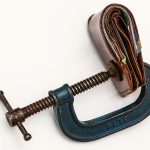
If clients are putting the squeeze on your cash flow by not paying their bills, consider hiring a collection agency.
By Luke McCann
One of the most challenging tasks someone can ever under take is not starting a small business but running a successful small business. Being an entrepreneur requires an individual to take on many different challenges such as marketing, payroll, and management.
Many small businesses fail due to customers not paying on time or refusing to pay at all. When projected revenue does not come in, it can stall out the growth of a new business. That missed revenue could be spent on advertising or investing in new equipment to further grow the business, but instead the business owners has to cut back spending in order to survive the missed revenue.
Most entrepreneurs will attempt to collect on the payment, but the endless demands of running a business can pile up and force them to give up on pursing the money owed. Usually this results in the business writing it of as a loss at the end of the year, but this action can be premature. Using a collection agency for small businesses to help collect the money owed can be a better option than writing the debt off as a loss.
How much does collection agencies charge?
Collection agencies will usually operate on what is called a contingency rate basis. This means the agency does not charge any upfront fees and will only get paid contingent on collecting the debt successfully.
The rate depends on many factors including the size of the balance, age of the debt, and the general details surrounding the debt.
In general, the older the debt the less likely the customer is to pay, which means the collection agency will have to charge more due to the increased amount of work that goes into collecting such a debt.
For example, let’s assume a HVAC company performed an installation for a customer and the cost was $6,000. The customer writes a bad check and then never returns phone calls or e-mails. A collection agency for the small business can agree to collect for a 20% contingency rate.
If the collection agency is able to collect the full $6,000 payment, it would keep 20%, or $1,200. The HVAC company would get the remaining $4,800.
While $1,200 may sound like a big loss to a small business, remember that something is better than nothing. It is better to get most of the revenue back rather than get none.
How to select a collection agency?
It isn’t hard to find a collection agency but finding one of the best collection agencies to represent your business can be challenging. Many collection agencies only collect within certain industries. For example, hiring a collection agency that collects on medical debt would not be a good fit for the HVAC company previously mentioned. Negotiating payment over an air conditioner install is much different than convincing someone to pay for a past due bill on a root canal.
If the collection agency has experience collecting within the industry, the next concern is the licensing of the agency. Most state requires a collection agency to be licensed to collect within a state. Some states have very few requirements while others are notoriously difficult to be licensed in.
Due to the highly litigated nature of the debt collection industry, selecting a collection agency that is licensed is very important. Furthermore, choose a collection agency that is familiar with FDCPA and operates within the guidelines put forward to avoid any issues coming up in the future.
When should a business hire a collection agency?
In general, when a business feels a customer is not going to pay a bill, then they should start the process of finding a debt collection agency.
The longer the debt goes past due the less likely a payment will ever come in. It is possible to wait a few weeks and the client will pay the bill in full. This is great as you avoid having to pay a collection agency a portion of that revenue. But every week you wait without payment the odds drop of ever getting a dime.
Most agencies will advise using an agency after 30 days of delinquency. This allows the business to place accounts going forward whenever it happens and increases the odds of recovering the most money as possible for the business.
There is no perfect time to hire an agency and usually a small business will know when they have exhausted all options and need to hand the account over to a debt collector.
When the situation is becoming stressful and distracting from growing a business successfully, it is time to use an agency.
_________
Luke McCann is the owner of CollectionAgencyMatch, an online service that helps match small businesses with agencies who can assist in collections. He has over a decade worth of experience in the debt collection industry.
